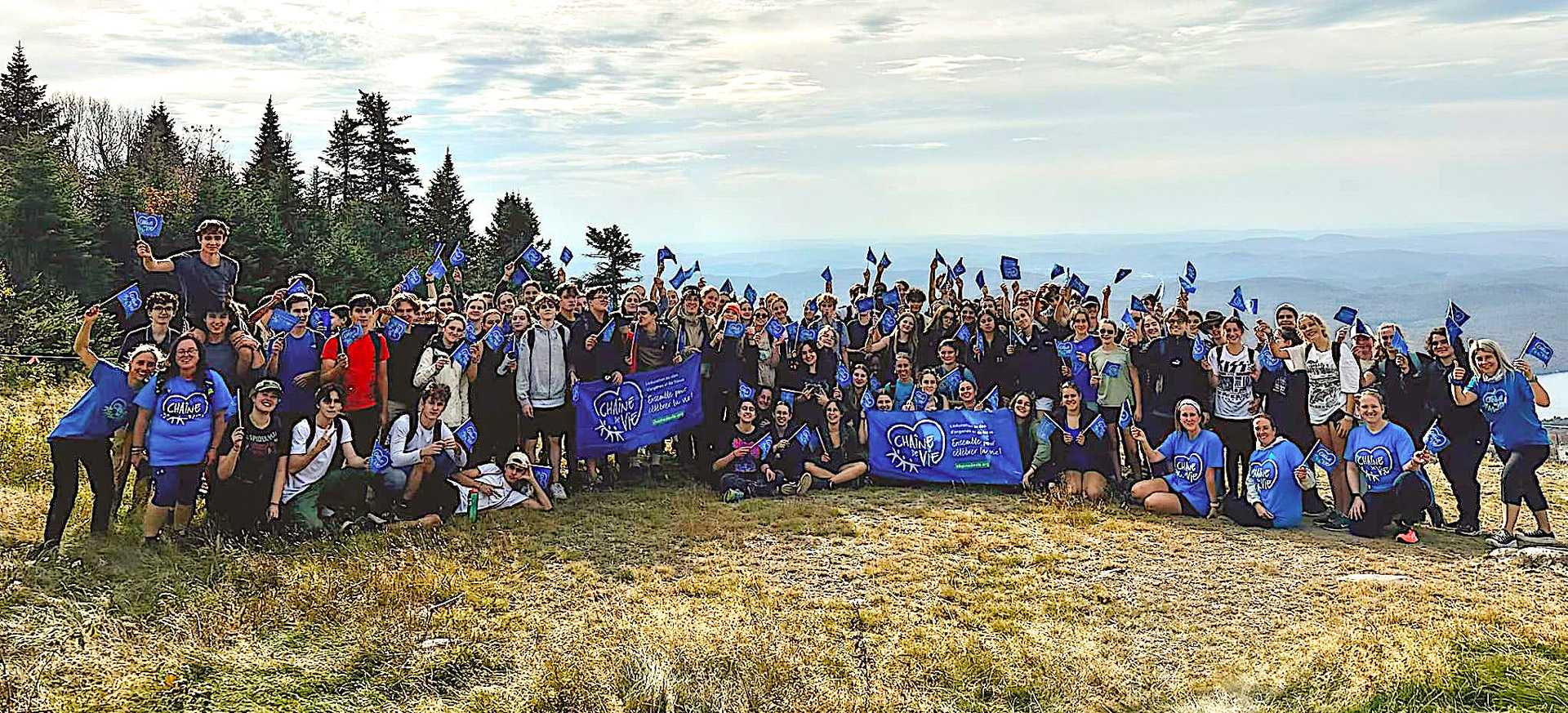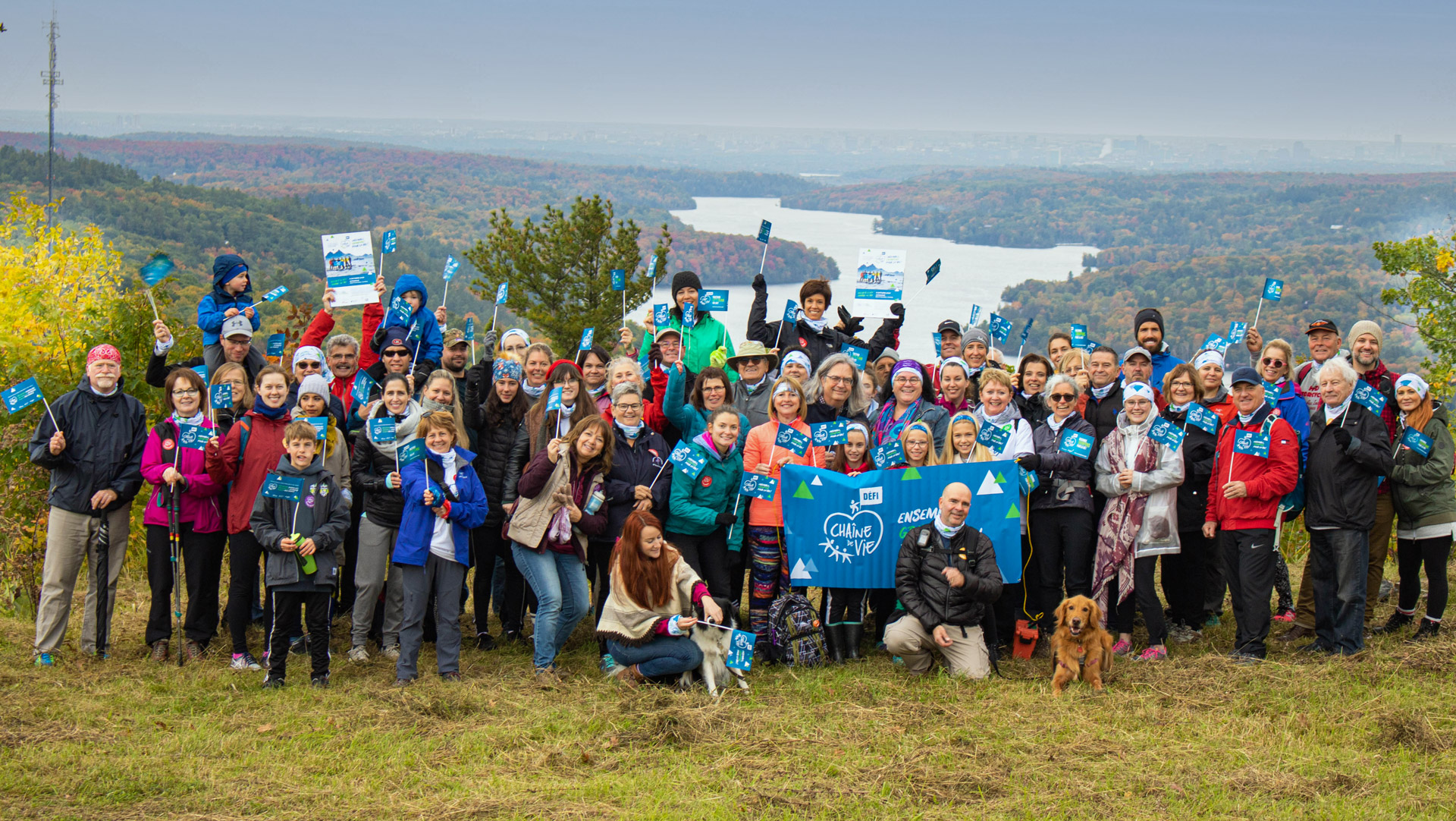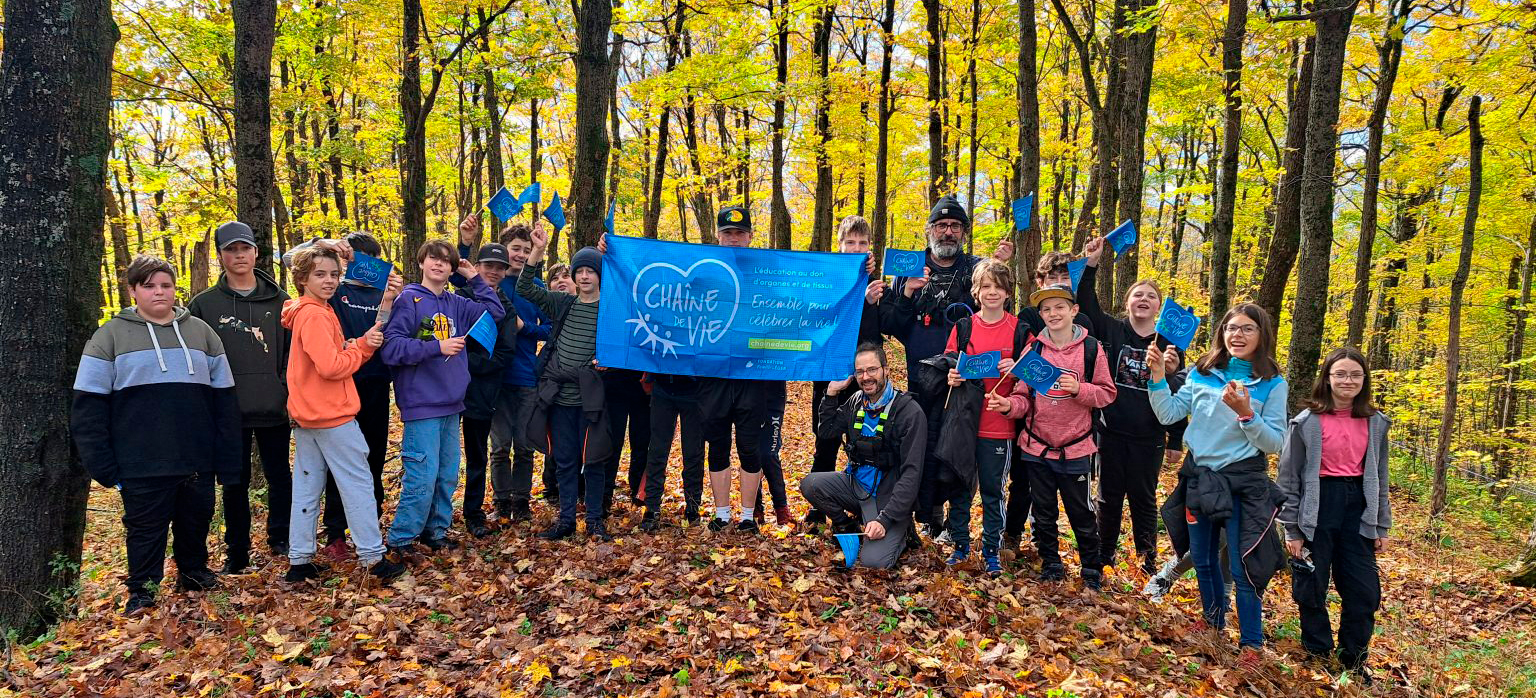
Organ donation: poignant testimonials to raise students’ awareness
The Chain of Life Challenge was once again highlighted at the Polyvalente de Saint-Jérôme this...
Read/View / Chain of Life Challenge

World Day for Organ and Tissue Donation: Essential links in the organ and tissue donation chain, donor families will be honoured in the Chain of Life Challenge on October 14 and 15.
QUEBEC CITY, October 4, 2023 — Organ donation is an act of generosity and solidarity that saves lives or improves the quality of life of recipients. At the heart of this altruistic gesture are the donor families, who must make a courageous decision in a tragic context: the brain death of a loved one. Often overlooked in the donation process, valuing their role is crucial, indeed essential, in shaping a strong donation culture within our society. This is why they are being honoured in the 2023 Chain of Life Challenge, as the flag-bearers climbing 15 mountains across Quebec as part of the World Day for Organ and Tissue Donation. They will do so in memory of a loved one and to support the importance of organ and tissue donation education in schools. Donor families from elsewhere in Canada, the United States, France and even the United Arab Emirates will also join the movement and proudly carry the Chain of Life flag to the top of their respective mountains.
“Organ donation is one of the most extraordinary acts there is because it gives life; and it’s because of donor families that these gifts of life exist,” stresses Thierry Houillon, patron of the Chain of Life Challenge. “So, please join us and climb one of the mountains to thank and honour all donor families.”
“Your support and contributions to the movement will help increase organ and tissue donation education in schools and at the same time, bring hope to people waiting for a transplant,” adds Isabelle Maréchal, also a patron of the Chain of Life Challenge.
When we realize that just over 1% of people die in a way that meets the criteria required to even consider organ donation (head trauma, stroke, drowning, suicide), we understand the importance of cherishing the gesture made by every single donor family. It’s promising to note that in Quebec, due in part to education and a better accompaniment of families, the percentage of family refusals dropped from 42% in 2014 to 32% in 2022 and thus enabled thousands of Quebecers to regain their health and have a second chance at life thanks to a transplant. Last year in Quebec, 171 donors and their families made it possible for 483 people to regain their health.
It must be kept in mind that the decision to authorize the donation of a loved one’s organs is one of the most emotionally complex moments that a family can go through. They often find themselves in the throes of an inner conflict, torn between the desire to respect the donor’s wishes, if she or he had expressed them, and the need to cope with their own personal grief. Because, in organ donation, death takes on a specific aspect: it is determined by the cessation of brain function. Unlike an illness, where those around you may have some time to prepare, here the fatal outcome is sudden and time becomes a race against the clock. On the one hand, you have to accept death, even if you can’t see it, because brain death is special in that the body is still warm, the chest continues to move and the organs continue to function, thanks to a ventilator. And, on the other hand, the organs must be removed quickly and you have to accept not being present for your loved one’s last breath. In such a context, where death seems difficult to accept, how could medical teams possibly take the body to the operating room for the retrieval of the deceased’s organs without the consent of the family? How could their distress be ignored?
“Several studies and testimonials from donor families refer to their difficulty to understand the reality of brain death,” explains Wendy Sherry, a nurse at the McGill University Health Centre. “Critical care workers must then use specific skills and competencies to explain brain death, accompany families in mourning and solicit organ donation.
We therefore welcome with gratitude a program like Chain of Life, which begins educating families about organ and tissue donation and about brain death before they find themselves in a hospital setting at an extremely difficult time.”
“It’s important to remember that without donors, and without donor families, there are no lives saved, “explains Lucie Dumont, founding president of Chain of Life. “By better educating the public about the context of organ donation and encouraging them to inform their loved ones of their wishes, we can greatly facilitate a decision that must be made in a context of urgency and great distress.”
This is why the stories of two donor families are at the heart of the Chain of Life education program. Their testimonials help educate young people about this issue and demystify misconceptions and fears, while at the same time reminding them of the importance of discussing organ and tissue donation with their loved ones. By explaining to young people the role of our organs and what brain death is, Chain of Life helps empower families who may find themselves in such a situation.
“Organ donation is an extraordinary act of generosity that changes lives, creates invisible bonds between families and strengthens human solidarity,“ continues Lucie Dumont. “As such, it is our duty as a society to support, raise awareness and recognize donor families because they embody the greatness of love, generosity and hope. Organ donation reminds us that, ultimately, we are all connected by our common humanity.”
Chain of Life is a charitable organization that relies almost entirely on public donations received through the Chain of Life Challenge to achieve its primary mission of educating young people about organ and tissue donation in Quebec secondary schools. This year’s Challenge highlights the touching stories of donor families. You can discover them by visiting https://chainedevie.org/en/take-action/take-on-the-challenge and clicking on each region. You can also register to take part in the Challenge, alone or on a team, or make a donation to a particular team or region. “We hope that many of you will join us on Quebec’s most beautiful summits for this uplifting family hike to celebrate the extraordinary gesture of donor families or by showing your support through a donation,” says Jean-Pierre Léger, vice-president of the Fondation de la famille Léger, principal partner of the Chain of Life Challenge.
For over 10 years, the Chain of Life education program has been teaching students aged 15 to 17 about the importance of organ and tissue donation. In the classroom, they take part in learning activities designed to help them form an enlightened opinion about organ and tissue donation and then engage in a civic action: a family discussion. By harnessing the incredible power of young people as ambassadors and agents of change, we can create a real culture of donation and help save lives. The program also makes young people aware of the inestimable value of a healthy body and the crucial importance of adopting healthy lifestyle habits. The Chain of Life program is currently taught in some 100 schools in Quebec, and over 100,000 young people have been touched by its message.
To sign up for the Chain of Life Challenge or to make a donation
Sophie Allard, ARP
Communications Director
Chain of Life
514 808-9474 ou sophieallard@chainedevie.org

The Chain of Life Challenge was once again highlighted at the Polyvalente de Saint-Jérôme this...

Students in the Écopleinair program at École secondaire l'Odyssée climbed Mont Valcourt. Their...